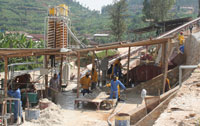The Ministry of Forestry and Mines, Thursday, met miners and traders to exchange views on the mineral traceability process, certification and tagging, before the law preventing illegal mineral trade comes into force on April 1.The meeting chaired by the Minister, Christophe Bazivamo, also aimed at assessing the progress of contracts between miners and government.


The Ministry of Forestry and Mines, Thursday, met miners and traders to exchange views on the mineral traceability process, certification and tagging, before the law preventing illegal mineral trade comes into force on April 1.
The meeting chaired by the Minister, Christophe Bazivamo, also aimed at assessing the progress of contracts between miners and government.
Bazivamo told The Sunday Times, Friday evening, that the most important achievement was "the strong commitment by the miners and traders to do everything possible so as to comply with the programme of traceability and certification as well as meet the April 1 deadline.”
"Also important was that everyone appreciated the need to curtail illegal minerals from outside the country because they are killing business for the local industry,” He said.
According to a statement from the ministry, Dr. Michael Biryabarema, the Head of Rwanda Geology and Mines Authority (OGMR), told the meeting that nine concessions are already certified and tagged. These are Rutongo mines, Nyakabingo, WMP-Gifurwe, WMP-Rwinkwavu, COMIKAGI, NRD-Nemba, Phoenix, FECOMIRWA, and New Bugarama Mining.
Biryabarema announced that in the shortest time possible, the 29 remaining will tag and certify their minerals.
The minister acknowledged that: "Not everyone is happy about the existence of a deadline because it is a constraint”, and that a wish to put more emphasis in requesting it be extended was voiced.
However, he noted, that since the power to extend it was "not in our control,” the meeting vowed to pursue all possible means to meet it.
Mid last year, the US President passed the Dodd-Frank Wall Street Reform and Consumer Protection Act, requiring companies to disclose, within nine months, whether they use minerals from DRC or neighbouring countries.
The minister reiterated government’s caution, as agreed during the just concluded eighth leaders’ retreat, that no non-certified, and untagged minerals, and tin, should enter the country.
Ministerial regulations being prepared will prevent the importation of non certified and tagged minerals and tin metals, in order to protect standards.
On mining contracts, the minister reminded the gathering that every six months, miners must make a geographic demarcation of the perimeter and proceed to industrial exploitation and provide evaluation reports.
After two years, they are required to provide a reserve estimate report. After four years [the license period], they must provide a feasibility study and if it indicates good performance, they are given a longer [30 years] mining concession license.
Mining in Rwanda accounts for about 30 percent of total exports. OGMR figures indicate that the country’s mineral exports fetched approximately $74 million in 2010. It fetched $54.6 million in 2009.
Early this year, OGMR set up a mineral tagging and sealing scheme, internationally recognized as the iTSCi project, which aims to curb illegal trading of minerals.
It targets to curb illegal trade in four conflict minerals; gold, tin, tantalum and tantalite.
With effect from April 1, a purchasing embargo on officially exported African minerals will be imposed on the market unless they contain the iTSCi tag.
Ends


